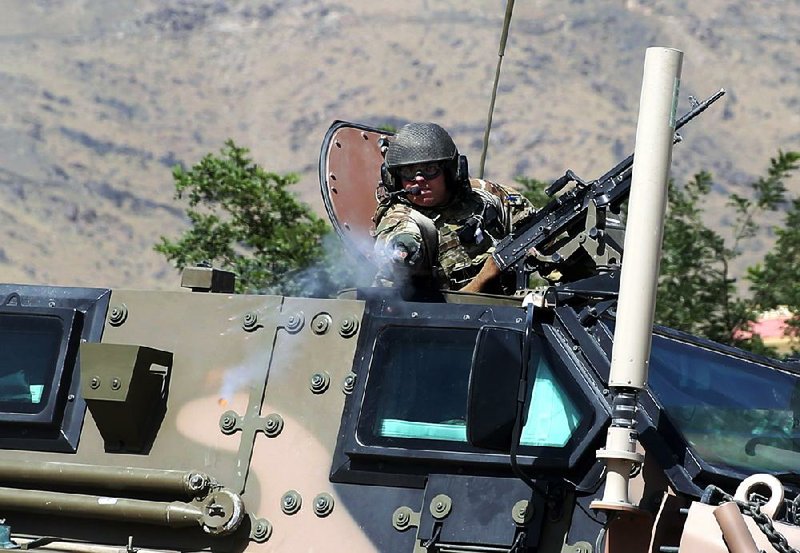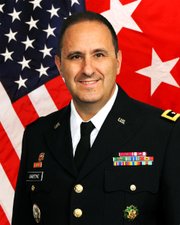KABUL, Afghanistan -- An American major general was shot to death Tuesday in one of the bloodiest insider attacks of the long Afghanistan war when a gunman dressed as an Afghan soldier turned on allied troops, wounding about 15 people, including a German general and two Afghan generals.
The Army identified the American officer as Maj. Gen. Harold Greene, a 34-year veteran.
An engineer by training, Greene was on his first deployment to a war zone and was involved in preparing Afghan forces for when U.S.-coalition combat troops leave the country at the end of the year. He was the deputy commanding general for the Combined Security Transition Command-Afghanistan.
Greene was the highest-ranked American officer killed in combat since the Vietnam War, when five major generals died. The last was Maj. Gen. John Albert Dillard, whose helicopter was shot down in 1970.
The attack at Marshal Fahim National Defense University wasn't the only assault by an Afghan ally on coalition forces Tuesday. In eastern Paktia province, an Afghan police guard exchanged fire with NATO troops near the governor's office, provincial police said. The guard was killed in the gunfight.
It wasn't immediately clear whether the two shootings were linked. Police said they were investigating.
Early indications suggested the Afghan gunman who killed the American general was inside a building and fired indiscriminately from a window at the people gathered outside, a U.S. official said.
There was no indication that Greene was specifically targeted, said the official, who spoke on condition of anonymity because he was not authorized to speak about the shooting.
The wounded included a German brigadier general and two Afghan generals, officials said. A U.S. official said that of the estimated 15 wounded, about half were Americans, several of them in serious condition.
U.S. officials still expressed confidence Tuesday in their partnership with the Afghan military, which will operate independently after most U.S.-led coalition forces leave at the end of the year.
The Army's chief of staff, Gen. Ray Odierno, issued a written statement Tuesday evening expressing condolences to Greene's family and the families of the others injured in the attack.
"These soldiers were professionals, committed to the mission," Odierno said. "It is their service and sacrifice that define us as an army. Our priority right now is to take care of the families, ensuring they have all the resources they need during this critical time.
"We remain committed to our mission in Afghanistan and will continue to work with our Afghan partners to ensure the safety and security of all coalition soldiers and civilians," he added.
The Iraq and Afghanistan wars have taken more than 6,700 U.S. lives.
Insider attacks rose sharply in 2012, with more than 60 coalition troops -- mostly Americans -- killed in more than 40 attacks. U.S. commanders imposed a series of precautionary tactics, and the number of such attacks declined sharply last year.
However, "it's impossible to completely eliminate that threat, particularly in a place like Afghanistan," said the Pentagon's press secretary, Navy Rear Adm. John Kirby.
Kirby said the general and other officials were on a routine visit to the military university on a base west of Kabul when the shooting occurred.
The White House said President Barack Obama was briefed on the shooting. Obama and Defense Secretary Chuck Hagel both spoke with Gen. Joseph Dunford, the top U.S. general in Kabul, who said a joint U.S.-Afghan investigation was underway and assured his bosses he still had confidence in the Afghan military.
Gen. Mohammad Zahir Azimi, a spokesman for Afghanistan's Defense Ministry, said a "terrorist in an army uniform" opened fire on local and international troops. Azimi and U.S. officials said the gunman was killed.
Taliban spokesman Zabihullah Mujahid in a statement praised the "Afghan soldier" who carried out the attack. He did not claim the Taliban carried out the attack, although in the past the Taliban have encouraged such actions.
Such assaults are sometimes claimed by the Taliban insurgency as proof of their infiltration. Others are attributed to personal disputes or resentment by Afghans who have soured on the continued international presence in their country more than a dozen years after the fall of the Taliban from power.
Mark Jacobson, a former NATO deputy civilian representative to Afghanistan and now a senior adviser at the private Truman National Security Project, said the threat of Afghan troops turning their guns of their American partners is a serious problem.
"Any sort of insider attack, no matter who the victim is, is going to have an impact on the morale of soldiers," Jacobson said, adding that when a higher-ranking officer is killed, "you might see a wider impact on morale."
Foreign aid workers, contractors, journalists and other civilians in Afghanistan are increasingly becoming targets of violence as the U.S.-led military coalition continues its withdrawal.
Afghan President Hamid Karzai condemned Tuesday's attack as "cowardly."
It is "an act by the enemies who don't want to see Afghanistan have strong institutions," Karzai said in a statement.
The site of the attack is part of a military compound known as Camp Qargha, where British forces oversaw the building of the officer school and its training program.
Soldiers were tense in the immediate aftermath of the shooting. One soldier in a NATO convoy leaving Camp Qargha fired an apparent warning shot in the vicinity of Associated Press journalists who were in a car, as well as pedestrians standing nearby. No one was wounded.
Greene's death already has prompted a review of safety protocols as Obama seeks to withdraw almost all American troops by the end of 2016, White House spokesman Josh Earnest said Tuesday.
Republican lawmakers critical of Obama's withdrawal plan pointed to the insider attack as a reason to change course.
In May, Obama announced plans to reduce U.S. troop strength to 9,800 by the end of this year and to half that number in late 2015. Only a small security assistance force at the U.S. embassy would remain by the end of 2016, as Obama prepares to leave office.
"What happened today is not only a personal tragedy, but a setback that demands leaders in Washington and Kabul take time to assess the state of our shared campaign and the necessary steps forward," said House Speaker John Boehner, R-Ohio. "I have told the president privately and publicly that my biggest concern is that America will end its mission in Afghanistan just short of the goal line."
House Armed Services Committee Chairman Howard "Buck" McKeon, R-Calif., said the attack "only underscores the importance of leaving Afghanistan when the job is finished -- rather than stubbornly adhering to arbitrary political deadlines."
But Greene's death isn't likely to change the Obama administration's thinking on Afghanistan, said Michael O'Hanlon, a defense analyst at the Brookings Institution in Washington who has made multiple visits to the country.
"It is tragic, but I don't believe it is strategically transformative in importance," O'Hanlon said, citing higher numbers of insider attacks in previous years.
In his statement offering condolences to Greene's family, Odierno said Tuesday that, "We remain committed to our mission in Afghanistan and will continue to work with our Afghan partners to ensure the safety and security of all coalition soldiers and civilians."
Greene, 55, grew up in upstate New York. During his career, he received a number of advanced degrees, including a doctorate from the University of Southern California.
An Army news release from 2009 said Greene's wife, Susan Myers, is a colonel at the U.S. Army War College. The couple also had two children, Amelia, who recently graduated from college, and Matthew, who is in the Army. Greene's family did not issue a statement Tuesday.
Before his current posting, Greene served as the deputy for acquisition and systems management for the assistant to the secretary of the Army. He also had worked in research and development in Aberdeen, Md., and Natick, Mass.
His military awards include the Legion of Merit and the Meritorious Service Medal.
Information for this article was contributed by Robert Burns, Rahim Faiez, Lolita C. Baldor, David Rising, Danica Kirka, Amir Shah, Jon Gambrell, Sagar Meghani and Monika Mathur of The Associated Press; by Thomas Gibbons-Neff, Patricia Sullivan and Julie Pace of The Washington Post; by Matt Pearce and David S. Cloud of the Los Angeles Times; by Matthew Rosenberg, Haris Kakar, Ahmad Shakib, Jawad Sukhanyar, Melissa Eddy, Patrick J. Lyons, Rick Gladstone and Richard A. Oppel Jr. of The New York Times; and by David Lerman, Tony Capaccio, Rainer Buergin, Eltaf Najafizada and Lisa Lerer of Bloomberg News.
A Section on 08/06/2014



